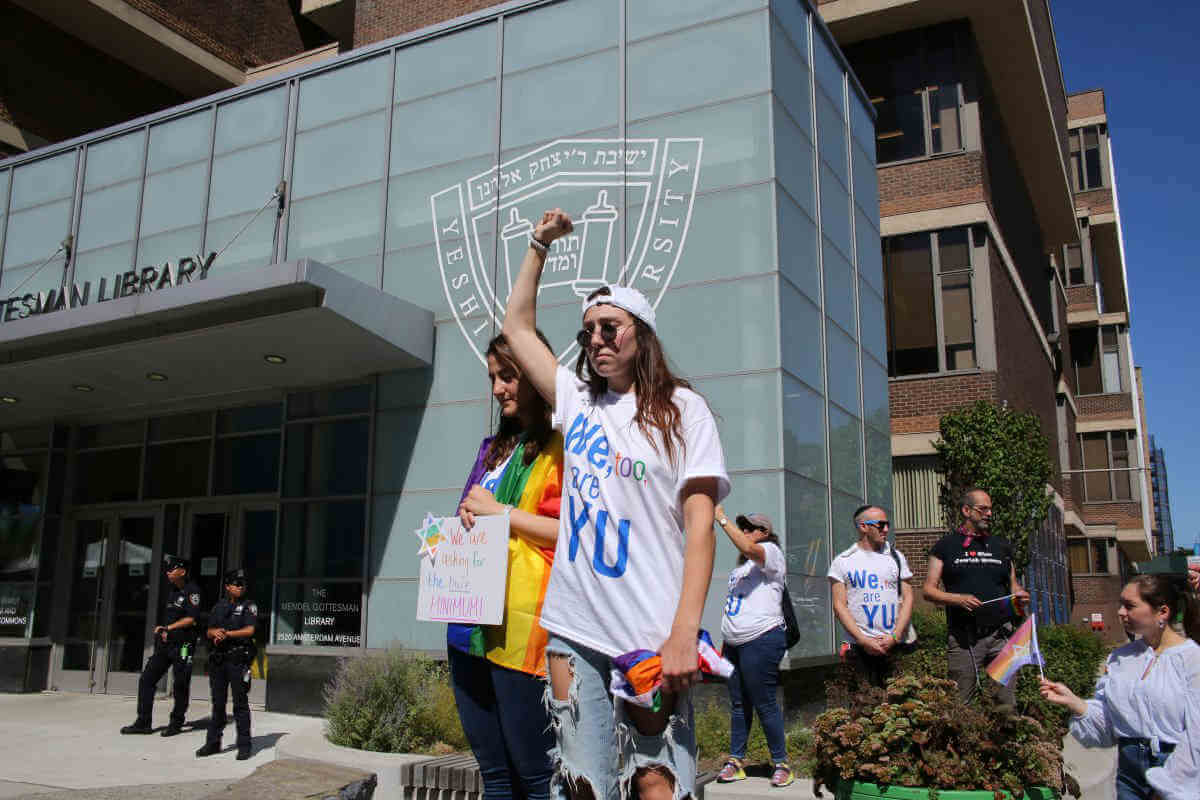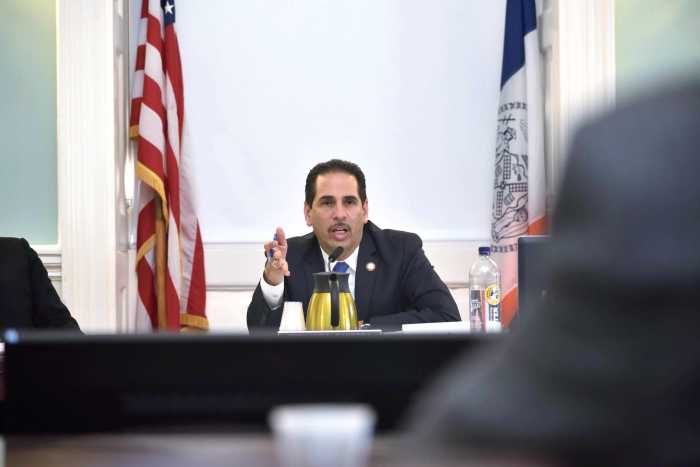Founded originally in the 19th century as a Jewish rabbinical seminary, Yeshiva University grew to a full-scale university with undergraduate and professional schools in a variety of disciplines, including law and medicine. Years ago, LGBTQ students at the medical and law schools were granted student organization recognition by the administrations of those schools, with the same privileges accorded other student groups and clubs. But attempts by undergraduate students since 2009 to gain recognition of their “YU Pride Alliance” were repeatedly denied by the university, leading to a lawsuit under the New York City Human Rights Law (NYCHRL) field in 2021.
On June 14, New York County Supreme Court Justice Lynn R. Kotler ordered the university to recognize the Alliance and give it all the rights and benefits accorded to other student groups.
Yeshiva put out a statement saying the ruling that it is not a religious institution was “obviously wrong,” pointing to requirements that students take some courses on Jewish theology and the pervasive requirements to observe Jewish law on campus, and said that the university would seek to have Justice Kotler’s order stayed while it appeals the case to the Appellate Division, First Department.
Yeshiva’s defense is two-fold. First, it argues that it is exempt from complying with the NYCHRL because of one sentence that appears in the law’s definition of a public accommodation: “For the purposes of this definition . . . a religious corporation incorporated under the education law or the religious corporation law is deemed to be in its nature distinctly private.” An organization that is “distinctly private” cannot be considered a “public accommodation.” Second, Yeshiva raised a constitutional First Amendment free exercise of religion defense.
Turning first to the exemption sentence, Justice Kotler wrote, “At first blush, the answer to this question may seem obvious given Yeshiva is an educational institution with a proud and rich Jewish heritage and a self-described mission to combine the ‘spirit of Torah’ with strong secular studies.” But upon scrutinizing the statutory language and the university’s own acknowledgement in the past that it is primarily an educational institution, the judge found that the “obvious” answer was incorrect.
When Yeshiva amended its charter in 1967 for filing under the NY Education Law, the new charter provision stated: “This corporation, incorporated as The Rabbi Isaac Eichanan Theological Seminary under the Membership Corporations Law of the State of New York on March 20, 1897, the name of which was subsequently changed by the Regents of the university of the State of New York to Yeshiva University, is hereby continued as an educational corporation under the Education Law of the State of New York. . . Yeshiva University is and continues to be organized and operated exclusively for educational purposes.”
The Religious Corporation Law defines a religious corporation as a “place of worship” that provides “religious services and services to senior citizens.” Justice Kotler pointed out that the university’s “organizing documents do not expressly indicate that Yeshiva has a religious purpose.” She found that lawyers for the university were making arguments about the implications of the court’s ruling that were “overblown.”
The court’s ruling does not mean that all schools organized under the Education Law cannot qualify for the religious corporation exemption. Rather, it means that the court must look at each individual school, its charter, and its operations, to determine whether it is operating as a “religious corporation.” She described the wide range of degrees conferred by the university as showing its overall secular nature.
The judge quoted at length from a letter that Cardozo Law School faculty members sent to the university’s president, Ari Berman, who is a defendant in this case, in support of the YU Pride Alliance’s application for recognition, expressing “dismay” that the university was refusing to let the students form such a group, and noting the important role the LGBTQ student group played at Yeshiva’s law school. The letter insisted that the University had to comply with the federal, state and city non-discrimination laws, as its own spokespersons had said in the past.
The judge quoted at length from a “fact sheet about gay student organizations” that the university had issued in 1995, presumably responding to questions it received from alumni and others about the recognition of LGBT students groups at the Cardozo Law School and Einstein Medical College, in which the university had stated: “Yeshiva University is subject to the human rights ordinance of the City of New York, which provides protected status to homosexuals. Under this law, YU cannot ban gay student clubs. It must make facilities available to them in the same manner as it does for other student groups.”
The judge also pointed out that in communicating with a state legislator in 2021 requesting capital construction funding, the university represented itself as a “501[c][3] not-for-profit institution of higher learning,” not as a religious corporation. “Yeshiva is either a religious corporation in all matters or it is not,” she wrote.
Yeshiva’s argument brought to this writer’s mind litigation in the 1980s about Georgetown University’s refusal to recognize gay student groups. Georgetown, a Catholic school controlled by the local Archdiocese, claimed to be a religious organization exempt from complying with the District of Columbia’s anti-discrimination law. The DC Court of Appeals rejected this argument, noting that despite its Catholic identity, it had represented itself as a secular educational institution when applying for receiving funding from the District government for its capital projects.
Yeshiva also argued that regardless whether it was deemed a religious corporation by the court, it was still entitled to claim an exemption as a matter of freedom of religion under the First Amendment, relying on the US Supreme Court’s decision last term in Fulton v. City of Philadelphia. The court rejected the Fulton precedent in the Yeshiva case, applying the long-established First Amendment precedent of Employment Division v. Smith, which held that laws of “general application” apply even though they may incidentally affect an organization’s religious practices or beliefs, so long as the law does not intentionally target religious practices but applies broadly to everyone.
The court distinguished a 1994 decision by the New York Court of Appeals that found that St. John’s University is a “religious institution” under the NY State Human Rights Law. St. John’s, said the Court of Appeals, was “operated, supervised or controlled by or in connection with a religious organization,” the Roman Catholic Church. Yeshiva, by contrast, is an independent institution, not owned or operated by a religious body. Furthermore, the judge found, the religious exemption under the NY City law is narrower than the religious exemption under the state law, and the Supreme Court’s decision in Fulton did not change the Supreme Court’s constitutional precedent of Employment Division v. Smith. (This point was driven home in Fulton by concurring opinions by some of the conservative Supreme Court Justices expressing dismay or regret that the Supreme Court did not use that case to overrule Smith.)
Justice Kotler rejected the university’s argument that requiring it to recognize the Pride Alliance would violate its freedom of speech, and once again raised the precedent of the medical and law school LGBT student organizations to show that such recognition would not necessary be construed as endorsement of “that group’s message,” as the university had recognized in its 1985 “fact sheet.”
In a June 16 story about the decision, the NY Times quoted one Pride Alliance’s lawyers, Katie Rosenfeld, who observed that the NYC Human Rights Law “protects all students of higher education in New York City from discrimination and requires all universities to follow it.” The Times article quoted one of Yeshiva’s lawyers, Eric Baxter from the Becket Fund for Religious Liberty, as stating that the ruling “is contrary to clearly established case law that says courts don’t get to second-guess a religious institution’s religious activities when its religious characteristics are plain and obvious. There are few religious institutions of higher education that are more religious than Yeshiva.”
So, the question remaining in this case is whether Justice Kotler’s textualist interpretation of Yeshiva’s corporate charter will take priority in the end over Yeshiva’s proclaimed identity as an Orthodox Jewish institution. Because of the First Amendment argument raised by Yeshiva, it could seek ultimate review on that issue in the US Supreme Court if it loses its appeals within the New York court system.



































